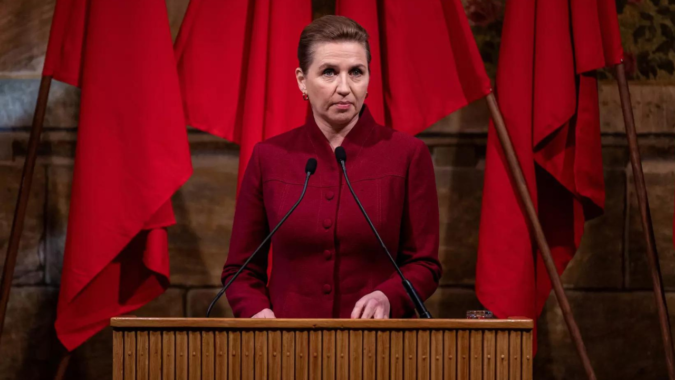COPENHAGEN: Danish prime minister Mette Frederiksen on Wednesday delivered a speech to parliament partly written using artificial intelligence tool ChatGPT to highlight the revolutionary aspects and risks of AI.
The head of the Danish government was giving a traditional speech as parliament gets ready to close for the summer.
“What I have just read here is not from me. Or any other human for that matter”, Frederiksen suddenly said part-way into her speech to legislators, explaining it was written by ChatGPT.
“Even if it didn’t always hit the nail on the head, both in terms of the details of the government’s work programme and punctuation… it is both fascinating and terrifying what it is capable of”, the leader added.
ChatGPT burst into the spotlight late last year, demonstrating an ability to generate essays, poems and conversations from the briefest of prompts.
The programme’s wild success sparked a gold rush with billions of dollars of investment into the field, but critics and insiders have raised the alarm.
Common worries include the possibility that chatbots could flood the web with disinformation, that biased algorithms will churn out racist material, or that AI-powered automation could lay waste to entire industries.
The subject is on the agenda of a high-level meeting on trade between the United States and the European Union this Wednesday in Lulea, Sweden.
A group of industry chiefs and experts, including Sam Altman whose firm OpenAI created the ChatGPT bot, warned Tuesday about the potential threat of “extinction” posed by the technology.
The part of Frederiksen’s speech drafted by ChatGPT included sentences like the following: “It has been an honour and a challenge to lead a broad government in the last parliamentary year.”
“We have worked hard to co-operate across parties and ensure a strong and sustainable future for Denmark,” and “We have taken steps to combat climate change and ensure a fairer and more inclusive society where all citizens have equal opportunities,” ChatGPT also wrote.
“Although we have faced challenges and resistance along the way, I am proud of what we have achieved together in the last parliamentary year.”
Frederiksen’s regular speechwriters have yet to comment on the quality of the writing.
The head of the Danish government was giving a traditional speech as parliament gets ready to close for the summer.
“What I have just read here is not from me. Or any other human for that matter”, Frederiksen suddenly said part-way into her speech to legislators, explaining it was written by ChatGPT.
“Even if it didn’t always hit the nail on the head, both in terms of the details of the government’s work programme and punctuation… it is both fascinating and terrifying what it is capable of”, the leader added.
ChatGPT burst into the spotlight late last year, demonstrating an ability to generate essays, poems and conversations from the briefest of prompts.
The programme’s wild success sparked a gold rush with billions of dollars of investment into the field, but critics and insiders have raised the alarm.
Common worries include the possibility that chatbots could flood the web with disinformation, that biased algorithms will churn out racist material, or that AI-powered automation could lay waste to entire industries.
The subject is on the agenda of a high-level meeting on trade between the United States and the European Union this Wednesday in Lulea, Sweden.
A group of industry chiefs and experts, including Sam Altman whose firm OpenAI created the ChatGPT bot, warned Tuesday about the potential threat of “extinction” posed by the technology.
The part of Frederiksen’s speech drafted by ChatGPT included sentences like the following: “It has been an honour and a challenge to lead a broad government in the last parliamentary year.”
“We have worked hard to co-operate across parties and ensure a strong and sustainable future for Denmark,” and “We have taken steps to combat climate change and ensure a fairer and more inclusive society where all citizens have equal opportunities,” ChatGPT also wrote.
“Although we have faced challenges and resistance along the way, I am proud of what we have achieved together in the last parliamentary year.”
Frederiksen’s regular speechwriters have yet to comment on the quality of the writing.
